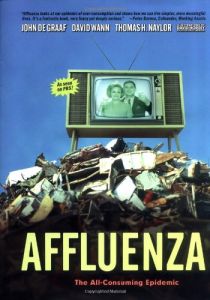Join getAbstract to access the summary!

Join getAbstract to access the summary!
John de Graaf, David Wann and Thomas Naylor
Affluenza
The All-Consuming Epidemic
Berrett-Koehler, 2001
What's inside?
Mega-malls: the cathedrals of American culture.
Recommendation
Sure, Affluenza is a polemic, but it’s a powerful one. Sure, some of the book’s more startling factual assertions are, on closer examination, somewhat distorted. But this is a call to arms, not a scholarly dissection. By depicting our consumer culture as a deadly epidemic, the authors provide a metaphor that simply and intuitively captures the fears and concerns of millions of people worldwide. While some conservative readers might scoff at a book that breathlessly states that life was better before the industrial revolution, getAbstract.com recommends this book as a valuable peek into the intellectual world of the anti-globalization left.
Summary
About the Authors
John de Graaf is a longtime producer of PBS documentaries. He has been a visiting scholar at Evergreen State College and lecturer on documentary production at the University of Washington. David Wann worked for more than a decade as a policy analyst for the U.S. Environmental Protection Agency. Thomas Naylor has taught economics for more than 30 years at Duke University and is now Professor Emeritus of Economics there. His articles have appeared in the several major newspapers and he is the author or co-author of 30 books.


















Comment on this summary